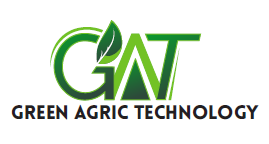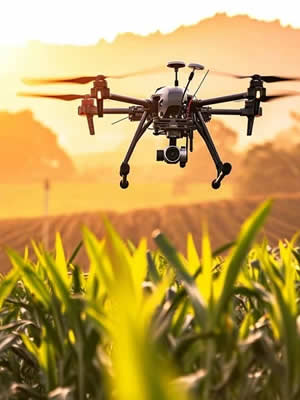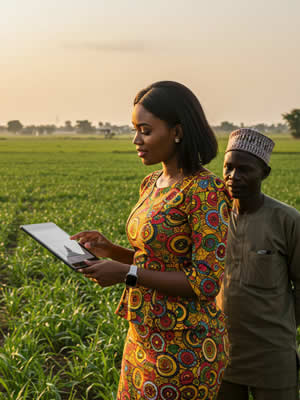Across Nigeria, farmers are facing an increasingly harsh reality — unpredictable rainfall, rising temperatures, and growing water scarcity. For smallholder farmers who make up over 70% of the nation’s food producers, these challenges threaten not only their harvests but their livelihoods. Yet, a quiet revolution is already changing that story — one driven by innovation, data, and sustainability.
This revolution is powered by smart irrigation systems, a technology reshaping how farmers grow food, conserve water, and improve their profits.
The New Face of Farming: What Smart Irrigation Really Means
Smart irrigation is a modern approach to watering crops efficiently using technology such as sensors, automated pumps, and weather-based controls. Unlike traditional systems that flood fields on fixed schedules, smart irrigation uses real-time data to determine exactly how much water a crop needs — and delivers it precisely when it’s needed.
The result is simple yet powerful: higher yields, reduced water waste, and lower costs.
At Green Agriculture Technology (GAT), this innovation lies at the heart of our mission to make agriculture in Nigeria more sustainable, climate-smart, and profitable for every farmer. By combining IoT-based systems with solar energy and data-driven insights, we help farmers transform their fields into productive, water-efficient ecosystems.
Why Nigeria Needs Smart Irrigation Now
Nigeria’s agricultural sector consumes more than 70% of the country’s available freshwater, yet most of this is lost due to inefficient irrigation methods. In regions like the North Central and North West, farmers are struggling with prolonged dry spells and unreliable rainfall that make traditional watering systems increasingly ineffective.
The situation demands smarter, more resilient solutions — and this is where technology bridges the gap. Smart irrigation allows farmers to monitor soil moisture, temperature, and weather forecasts directly from their phones or computers. Instead of relying on guesswork, they can make decisions based on accurate data.
In a country where every drop of water counts, precision irrigation is no longer optional — it’s essential.
The Green Agriculture Technology Difference
At GAT, our approach goes beyond selling equipment — we provide a full ecosystem of support. From system design and installation to farmer training and post-installation monitoring, we ensure our solutions deliver measurable results.
In Enugu, for example, a group of smallholder farmers who adopted GAT’s automated irrigation system recorded up to 40% less water usage and 35% higher crop yields within their first planting season. In Kaduna, vegetable growers using our smart drip systems not only reduced their irrigation time by half but also cut their energy costs by 20%.
These are not isolated cases — they are the proof that technology, when localized and well-managed, can transform small-scale farming in Africa.
Understanding the Return on Investment (ROI)
One common misconception is that smart irrigation is too expensive for small farmers. While initial setup costs can range between ₦500,000 and ₦1.5 million depending on the size of the farm and level of automation, the return on investment is surprisingly fast.
Most farmers recover their initial costs within 18 to 24 months, thanks to savings on water, fertilizer, and labor, combined with higher productivity and improved crop quality. When systems are powered by solar energy — another core GAT offering — the savings increase even more by cutting fuel and electricity expenses.
In other words, smart irrigation doesn’t just make sense for the environment — it makes sense for the pocket too.
Challenges and How Farmers Are Overcoming Them
Of course, adopting new technology always comes with challenges. Some farmers worry about the upfront costs, while others are concerned about maintenance or power supply.
At Green Agriculture Technology, we’ve tackled these barriers through innovative financing options, cooperative-based ownership models, and solar-powered systems that eliminate dependency on unreliable grid electricity. We also provide on-site and virtual training programs so farmers can operate and maintain their systems with confidence.
By empowering farmers with both the tools and the knowledge they need, we’re building lasting change — not short-term projects.
The Future of Smart Farming in Nigeria
Smart irrigation is more than a technological trend; it’s a movement towards resilience, food security, and climate action. With Nigeria’s smart agriculture market expected to exceed $120 million by 2030, the potential for widespread adoption is enormous.
Every year, more farmers are discovering that with the right technology and guidance, they can grow more food with less water, earn more income, and protect the environment at the same time.
This is the future of farming — intelligent, sustainable, and data-driven. And it’s happening now.
Conclusion
The story of Nigeria’s smallholder farmers is being rewritten by innovation. From water conservation to higher yields and reduced costs, smart irrigation is proving that sustainable farming is not only possible but profitable.
At Green Agriculture Technology, we are proud to lead this transformation. Through our smart irrigation systems, solar-powered solutions, and continuous farmer support, we’re helping communities turn agricultural challenges into opportunities.
Join the movement today.
Visit greenagrictech.org to learn how you can adopt smart irrigation and be part of a greener, more productive Nigeria.





